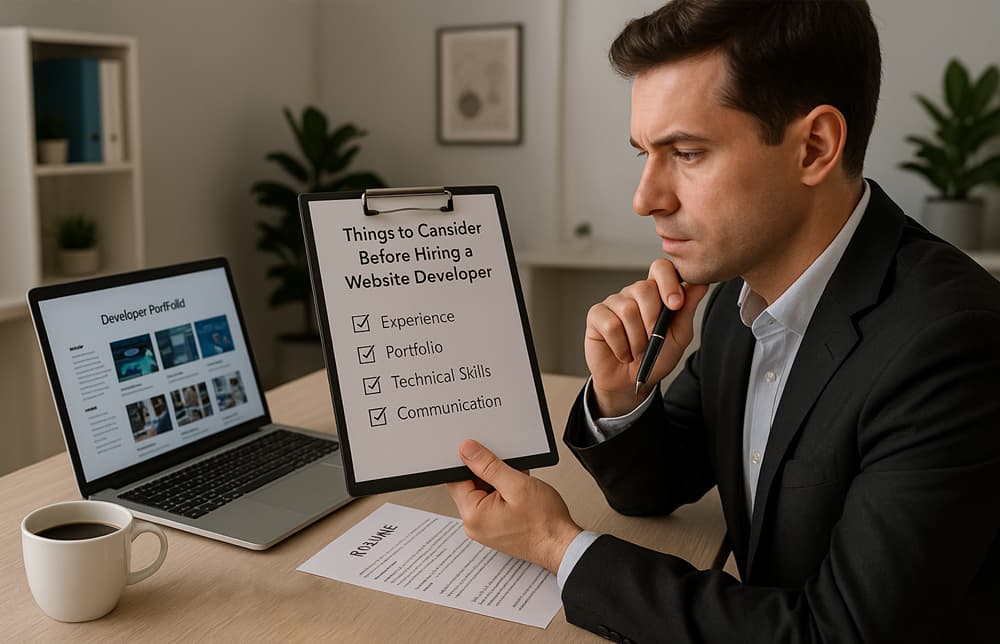Things to Consider Before Hiring a Website Developer

A strong and functional site is the necessity of just about every successful company or individual brand in 2025. It is your online shop window, portfolio, information station or means of communication and in many instances it is the first and last thing your audience sees. Whereas the concept of strong web presence appears to be alluring, the intricacies of the web site creation usually require one to involve the expert.
India has become the new powerhouse of Website Development and the number of professionals and agencies in the country is huge and they charge competitive prices. This is why searching a proper website developer India ends up being a common preference among businesses in the entire world. On the other hand, having many options available leads to one having to be cautious especially when choosing to employ the services of a professional that would best suit your needs.
This informative content will expound the critical considerations of employing a site developer by making you stroll in the shoes of a watchful shopper who has his/her way of making a right decision that will not only assure success in your virtual business.
Aspects To Put Into Consideration Before Employing a Website Developer
A considerable sum of time and money is invested in hiring a website developer in India. An organized process, and these are the main considerations, will assist you to get a partner who is technologically competent, and also finds value in your business and working style.
1. Clarify a Purpose of your website and its Needs
You must know what you need to have done with your website before you begin to look at developers. This is the most important basic step.
What do you want your site to accomplish above all? (e.g. Generate leads, sell products/services, present a portfolio, offer information, create a community, be a blog).
Who do you wish to target? This will be informed by their demographics, behavior and preferences which will guide design and content.
What particular functionalities do you require? (e.g., E-commerce functionality, booking system, login for users, contact forms, search function, blog, photo albums, social network integration, support for multiple languages).
What type of content will your site contain? (Do you already have text, images, videos prepared, or do you require content development assistance?)
What is your preferred look/brand identity? Give examples of websites you enjoy and dislike.
What is your realistic budget range and desired timeline? Be willing to share these openly.
Having a clear brief will allow potential developers to see your needs and offer more precise proposals.
2. Check Out Their Portfolio and Relevant Experience
A developer's history is the best measure of their ability and style.
Examine Their Portfolio: Check live sites that they have created. Don't merely look; click through pages, check out functionalities, and examine the general user experience (UX) and user interface (UI).
Industry Relevance: Has it worked on sites like yours or in your field? This means a comprehension of your industry's unique challenges, regulatory compliance (if applicable), and standard user behaviors.
Quality of Design: Evaluate the aesthetic appeal, contemporary look, and responsiveness of their past work. Does it scale well across various devices (mobile, tablet, desktop)?
Complexity of Projects: Does their portfolio show them to be capable of managing the degree of complexity you need? If you need bespoke functionalities, look for indicators of bespoke development, rather than template adjustments.
Test Functionality: Take a note of how functionality works on their portfolio websites. Are forms submitting properly? Is navigation user-friendly? Do images load quickly?
3. Test Their Technical Capability and Tech Stack
A good website developer should be well-versed in a variety of applicable technologies.
Core Web Technologies: Make sure they are masters of HTML5, CSS3, and JavaScript (and contemporary frameworks such as React, Angular, or Vue.js if your project requires them).
Backend Languages & Databases: If your site is dynamic (which many are), they should have skills in backend languages such as Python (Django/Flask), PHP (Laravel), Node.js (Express), or Ruby on Rails, and database administration (e.g., MySQL, PostgreSQL, MongoDB).
CMS Experience: If you want them to work with a Content Management System (CMS) such as WordPress, Drupal, or Joomla, check their experience with that particular platform, including custom theme development, plugin integration, and optimization.
E-commerce Platforms: If you require an online store, ask about their experience with platforms such as WooCommerce, Shopify (specifically for custom themes), or Magento.
Responsive Design Principles: They should practice mobile-first development to make your site look good on any device.
SEO Best Practices: A highly competent developer will design your website with search engine optimization (SEO) in consideration from the very beginning, promoting clean code, quick loading times, and good structure for improved search rankings.
Security Measures: Ask them how they secure websites, such as providing SSL certificates, encrypting data, blocking common vulnerabilities, and following secure coding principles.
Scalability: In case you're expecting to grow, the developer ought to suggest an architecture that will be able to grow with your traffic and content demands without the need for rebuilding later.
4. Know Their Development Process and Project Management
An open, transparent process is important for a seamless project.
Discovery Phase: How do they come up with detailed requirements and grasp your business objectives?
Design & Prototyping: Do they give you wireframes, mockups, and interactive prototypes to see and comment on before coding starts? How many rounds of revisions are included?
Development Methodology: Do they follow Agile (iterative development with continuous feedback) or Waterfall (sequential development)? Agile is commonly preferred due to its flexibility.
Communication Channels: How often will you be updated? What communications tools do they employ (e.g., project management software such as Trello/Jira, Slack, email, video calls)?
Testing Procedures: What type of testing do they do (e.g., functional, performance, security, cross-browser compatibility)? How do they manage bug fixes?
Launch and Deployment: What's their method for putting the website live? Do they manage domain and hosting setup?
5. Check Client Reviews, Testimonials, and References
Don't take their word for it. Seek external confirmation.
Online Reviews: Look on sites such as Google My Business, Clutch, GoodFirms, and local business listings for reviews. Take note of recurrent patterns in good or bad feedback.
Testimonials: Although generally vetted, testimonials on their website may provide some insight.
Client References: Get contact details for former clients, particularly those with projects that match yours. Interview them directly about their experience in terms of communication, quality, meeting deadlines, and after-launch support.
6. Talk about Pricing, Contract, and Value Proposition
Cost matters, but value matters more.
Detailed Proposal: Demand a detailed proposal that explicitly outlines costs by stage or feature, rough timelines, and every deliverable.
Pricing Model: Ask them about their pricing model (e.g., fixed-price for specific projects, hourly rates for flexible work, retainer for continuous work). Select what best suits your project's predictability.
Avoid Surprise Costs: Explain any possible extra charges for third-party software, paid themes/plugins, stock images, or surprise changes.
Value for Money: Sometimes the lowest price is not the best value. A bit more investment in a good Website Developer India can end up saving you a lot of money and hassle in the long term by providing a quality, effective website.
Contractual Clarity: Make sure the contract clearly outlines the scope of work, project milestones, payment schedule, intellectual property (IP) ownership (you own the code!), warranty period for bug fixes, and post-launch maintenance.
7. Post-Launch Support and Maintenance
A website requires regular maintenance to be effective and secure.
Maintenance Plans: Do they provide recurring maintenance packages including security updates, CMS/plugin updates, backups, and performance monitoring?
Bug Fixes: What is their bug-fix policy for bugs that come up after launch? How quickly do they respond to critical issues?
Future Enhancements: Do they support future feature addition or changes as your business grows?
Training: Will they educate you or your staff on how to work with the website's content, the CMS, and basic analytics?
8. Communication Skills and Cultural Fit
Good communication is important to a successful project, particularly with distributed teams.
Clarity and Responsiveness: Do they clearly communicate, stay away from jargon, and respond quickly to your questions?
Proactive Suggestions: Do they provide suggestions and insights that can enhance your site, instead of simply following commands?
Problem-Solving: How do they handle challenges or surprises along the way to development?
Cultural Alignment: If hiring a Website Developer India, consider cultural differences in communication and work styles. A good developer will adapt to your preferred communication methods.
Conclusion
Hiring the right Indian website developer is a pivotal step in establishing or enhancing your online presence. The landscape of website development in India offers a wealth of talent and cost-effective solutions. By carefully establishing your requirements, properly screening portfolios, knowing about development processes, getting costs cleared, and giving priority to good communication and support after launch, you can make a proper choice. The best developer will not only create a website; he will become a strategic partner, assisting you in meeting your online objectives and making your online platform a powerful, safe, and worthwhile asset for your company in 2025 and beyond.
Recent Blogs

How Much Does it Cost To Build eCommerce website Design in India? An investment worth it

How Much Does it Cost to Develop a React Native Mobile App?
